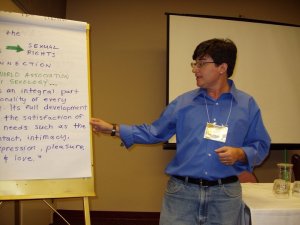
Why I Teach Sex Ed
Lis Maurer
The Center for LGBT Education, Outreach & Services, Ithaca College
Two central experiences shaped my interest in sex education. Both took place while I was a teenager and continue to fuel my passion and commitment to provide accurate sex education in ways that are useful to people.
Everyone in 11th grade was required to take one semester of health to last them throughout their high school career and adult lives. The course covered the respiratory, digestive, and circulatory systems; nutrition, exercise, and just saying no to drugs and alcohol. Sandwiched in there somewhere between renal functioning and “this is your brain on drugs,” there was one period devoted to reproductive systems, conception, and birth control. All semester, I had looked forward to those forty-two minutes to learn everything my parents had never told me about sex.
The night before the class, I was giddy. Not only would all my questions be answered, but an actual person from Planned Parenthood was coming to class as a guest speaker and bringing a kit full of birth control we could actually see and touch. Sure, I knew nothing would be said about people like me (people of different sexual orientations and gender identities). I was content to learn about the sexuality of heterosexual, conventionally gendered people; perhaps I could just extrapolate the rest. At the time, it had never even occurred to me to expect more – the possibility to be acknowledged, respected, named even.
It was a budding baby sex educator’s dream. Until…I woke up that morning with the most virulent case of the flu I had ever had. Try as I might, I couldn’t get myself upright and not throwing up for more than a couple minutes. I tried – I was not going to miss that class! But in the end I wound up staying home sick, on the couch all day watching Match Game and $10,000 Pyramid. I was devastated. And I was probably the one kid ever to be so upset about watching TV all day instead of going to school. My one chance to learn about sexuality was sabotaged by microbes and bad timing.
A lot of folks can remember messages they received from their family about sexuality. The overwhelming message I received from my parents– crickets. Complete silence. Nothing to see here, move along. No, nope, la la la la we can’t hear you! This absence of a message – even in response to my direct questions from the time I was small through adolescence – encouraged, compelled even, my curiosity and my determination that no one else would experience this eerie void of information. So parents out there – if you want to avoid raising a child with career aspirations as a sex educator, make sure you talk early and often about sex!!
I made it all the way to college without any information whatsoever about sex. I threw myself into all the basic quadrants of college life – studying, friends, dating, drinking. Somehow, without internet or apps, we sexually and gender diverse folks managed to meet and form community. Down the hall, a dormmate’s uncle was one of the first people to be diagnosed with a terrifying new ailment, at that time called GRID –“Gay Related Immune Deficiency.” We stayed up all night playing Trivial Pursuit, sharing coming out stories, occasionally visiting the gay bar in the Big City…and we often talked in hushed tones about this new “gay plague” and what it might mean for us. Our small circle of friends was our refuge within a campus and town that vacillated between being covertly and overtly hostile.
There was also a lesbian, gay and bisexual themed student group on campus, and we had all that was needed to reach out and support each other in the 20th century – an office in the Student Union, with a desk and telephone. Amazing resources at that time! We organized presentations for classes and dorms, fielding questions from peers and professors about our experiences. The most supportive of our peers said we were courageous and bold for fostering understanding; others heckled, or threatened us as we walked home, or worse. Bold was not the way I thought of our efforts – I could not imagine living life without authenticity. People needed a chance to talk – if I could help, I was happy to try. As myths and fear grew about HIV/AIDS, it became clear that many people didn’t even understand human sexuality basics.
Things went well until we were thrown into the most dreaded of college rituals for LGBT students – landing room assignments for the next year – scrambling to secure living situations as safe as we could arrange, or the least dangerous. My brilliant plan was to live on the “Quiet Floor” that was conveniently near my girlfriend’s dorm. Rather than be in the general pool of thousands of students who’d be randomly assigned housing, I’d know exactly where I was living.
The plan backfired. My roommate and many of my hallmates had been assigned, against their wishes, to the Quiet Floor because they were on judicial probation for violations of the conduct code. It was their last chance to avoid being expelled. Those of us who chose that floor found ourselves being verbally and physically bullied by them. Constant threats, intimidation, damage to our belongings, and physical violence made our living situation unbearable. Gay people, a person who had a disability, people of color, a person who was just perceived as “different” – even our RA who was studying for the ministry – were the targets. No matter what we did, the bullying did not stop. Some friends and a professor encouraged me to go see a particular staffer on campus. I didn’t understand why. We had appealed to our Residence Director, and to other people up the chain of command. No one did anything to intervene, and several told us the situation was our fault. This particular woman had nothing to do with that system at all. But eventually, when all avenues were exhausted and I had nothing left to lose, I went to see her to vent before packing and leaving for good. I told her I was dropping out, that no one would notice if I left school, that it was ridiculous to think I could make something of myself in a world that wanted to erase me. It just wouldn’t matter. She looked directly into my eyes, paused, and said words I will never forget – “It matters to me.” Long story short, I decided to stay and eventually graduate.
I am a sex educator to pay this forward – I want to leave students with those same words. You matter. You matter to me, you matter to each other, you matter to the world.
Later my dream job as a sexuality educator, did materialize. Through good fortune and timing, I learned at the feet of the masters in the field – Peggy Brick, Sol Gordon, and many others. My appreciation for having these opportunities has only grown over the years.
Since that time I’ve provided sex education in diverse settings for students and teachers in the United States, peer educators in Namibia, Girl Scout troops, religious education classes, correctional facilities, day care providers, and communities of elders, among others. I’ve seen quite a bit of change around how the field grapples with the needs of folks on the margins, and those even more precariously on the margins of the margins. Class, race, ethnicity, age, ability, sexual orientation and gender identity are all parts of the conversation now – still not fully included, often overlooked, but certainly expanded from the time I entered the field.
Now, I have a job that did not exist when I was in college. My role is to foster the academic success and personal growth of LGBT college students, and to provide opportunities to enhance understanding and appreciation of LGBT people and themes. What does this mean? I provide class presentations, professional development sessions, consult with students, staff, and faculty, support syllabus development to infuse and integrate the experiences and needs of LGBT people into the curriculum, keep an ear out for promising practices, and occasionally even get to share some of my own.
What’s the result? Students who are eager to major in Queer Studies, or work in LGBT specific jobs? Sometimes. And that’s great. But more often than not, it translates into something much more radical – students studying whatever they want. Students pursuing all career paths, not just those they think they can get by with and face the least amount of discrimination. Students aspiring untethered, rather than settling for something less out of a belief in the inevitability that they would amount to nothing or live sad, doomed lives. My hope is that through comprehensive sex education increasing numbers of students will be able to better access their right to an education, free from harassment and fear, so they can achieve and aspire to love who they love, be who they are, and do what they want.
And what incredible, talented, committed, driven students I’ve come to know. They pursue their interests, somewhat free of worries about discrimination or harassment, with vigor and abandon. I am honored to know them, if only for just a little while. My hope is that they will go out in the world and make it a better place, and take care of each other along the way. It’s a big, wide world, and that world will be all the better because of them and the work we do together to build more spaces in which gentle and spirited inquiry, common humanity, dignity, and respect become the norm.


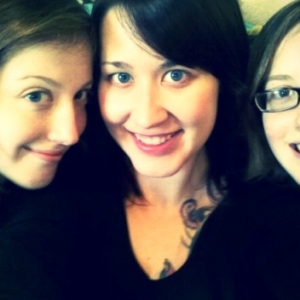
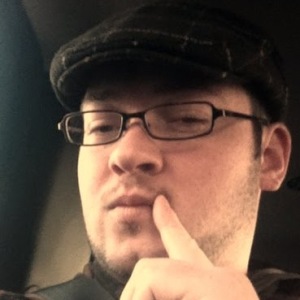
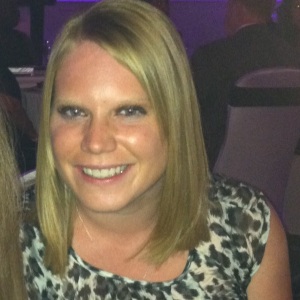
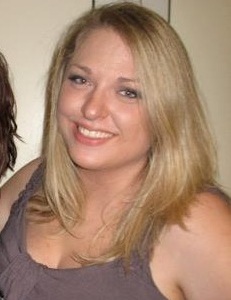
Wonderful! Beatifully written! Inspiring! Thank you for your honesty, openness, and wit.
Thank you, Lis! We are so fortunate that your parents didn’t talk to you about sex – you have given so much to so many! Keep up the great work!